unit2poemswords
- 格式:ppt
- 大小:1.65 MB
- 文档页数:25
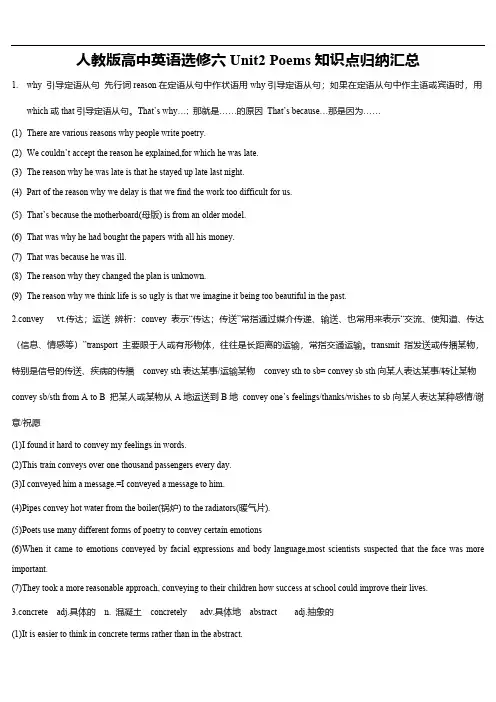
人教版高中英语选修六Unit2 Poems知识点归纳汇总1.why 引导定语从句先行词reason在定语从句中作状语用why引导定语从句;如果在定语从句中作主语或宾语时,用which或that引导定语从句。
That’s why…; 那就是……的原因That’s because…那是因为……(1)There are various reasons why people write poetry.(2)We couldn’t accept the reason he explained,for which he was late.(3)The reason why he was late is that he stayed up late last night.(4)Part of the reason why we delay is that we find the work too difficult for us.(5)That’s because the motherboard(母版) is from an older model.(6)That was why he had bought the papers with all his money.(7)That was because he was ill.(8)The reason why they changed the plan is unknown.(9)The reason why we think life is so ugly is that we imagine it being too beautiful in the past.2.convey vt.传达;运送辨析:convey 表示“传达;传送”常指通过媒介传递、输送、也常用来表示“交流、使知道、传达(信息、情感等)”transport 主要限于人或有形物体,往往是长距离的运输,常指交通运输。
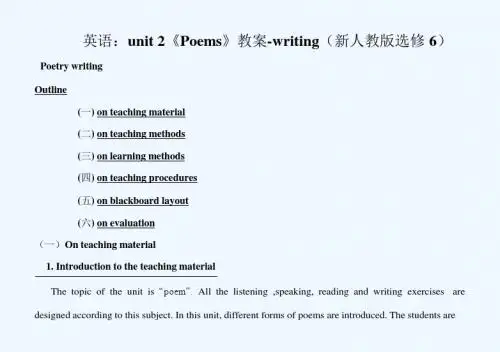
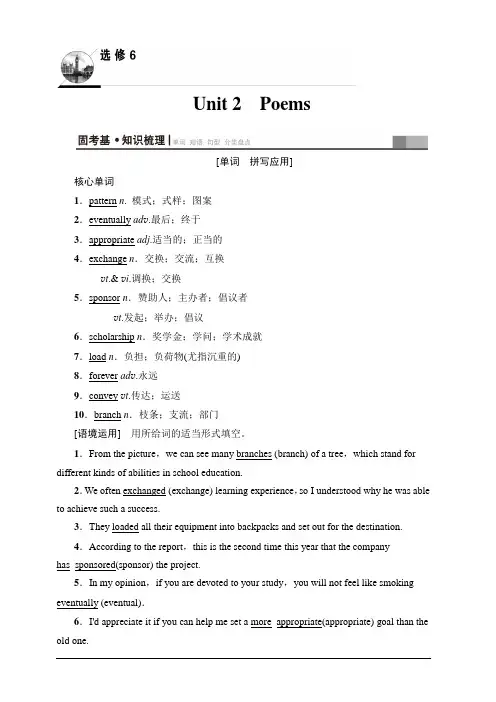
Unit 2Poems[单词拼写应用]核心单词1.pattern n. 模式;式样;图案2.eventually ad v.最后;终于3.appropriate adj.适当的;正当的4.exchange n.交换;交流;互换v t.& v i.调换;交换5.sponsor n.赞助人;主办者;倡议者v t.发起;举办;倡议6.scholarship n.奖学金;学问;学术成就7.load n.负担;负荷物(尤指沉重的)8.forever ad v.永远9.convey v t.传达;运送10.branch n.枝条;支流;部门[语境运用]用所给词的适当形式填空。
1.From the picture,we can see many branches (branch) of a tree,which stand for different kinds of abilities in school education.2.We often exchanged (exchange) learning experience,so I understood why he was able to achieve such a success.3.They loaded all their equipment into backpacks and set out for the destination.4.According to the report,this is the second time this year that the companyhas_sponsored(sponsor) the project.5.In my opinion,if you are devoted to your study,you will not feel like smoking eventually (eventual).6.I'd appreciate it if you can help me set a more_appropriate(appropriate) goal than the old one.拓展单词1.salt n.盐;食盐→salty adj.含盐的;咸的2.end n.& v.终止;结束→ending n.结尾;结局→endless adj.无穷的;无止境的3.translate v.翻译→translation n.翻译;译文→translator n.译员;翻译家4.transform v.转化;转换;改造;变换→transformation n.转化;转换;变换5.sorrow n.悲伤;悲痛;懊悔→sorrowful adj.悲伤的;悲痛的6.dark adj.黑暗的→darkness n.黑暗;漆黑7.warm adj.暖和的;温暖的→warmth n.暖和;温暖8.piano n.钢琴→pianist n.钢琴家;钢琴演奏者9.poet n.诗人→poem n.诗→poetry n.诗(总称);诗意[语境运用]用所给词的适当形式填空。
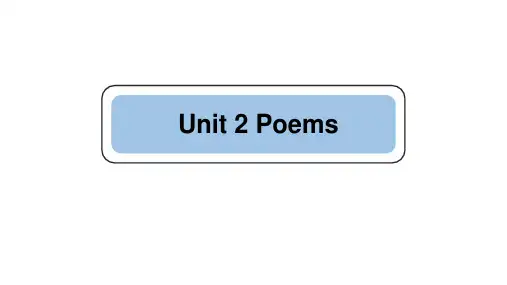
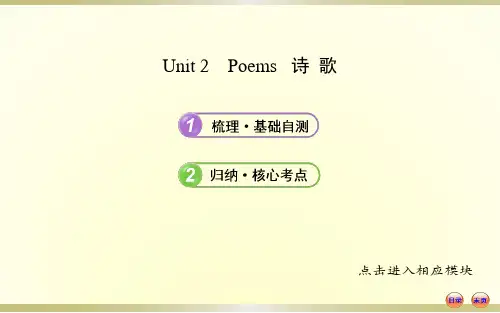
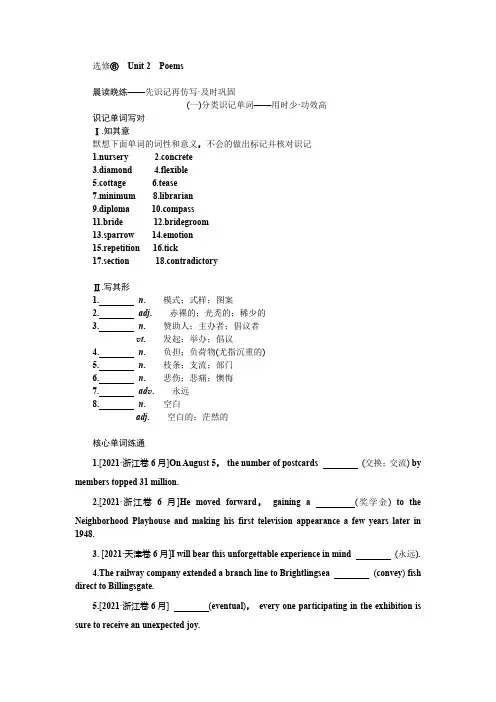
选修⑥Unit 2Poems晨读晚练——先识记再仿写·及时巩固(一)分类识记单词——用时少·功效高识记单词写对Ⅰ.知其意默想下面单词的词性和意义,不会的做出标记并核对识记1.nursery2.concrete3.diamond4.flexible5.cottage6.tease7.minimum 8.librarian9.diploma pass11.bride 12.bridegroom13.sparrow 14.emotion15.repetition 16.tick17.section 18.contradictoryⅡ.写其形1.n.模式;式样;图案2.adj. 赤裸的;光秃的;稀少的3.n. 赞助人;主办者;倡议者v t. 发起;举办;倡议4.n. 负担;负荷物(尤指沉重的)5.n. 枝条;支流;部门6.n. 悲伤;悲痛;懊悔7.ad v. 永远8.n. 空白adj. 空白的;茫然的核心单词练通1.[2021·浙江卷6月]On August 5,the number of postcards (交换;交流) bymembers topped 31 million.2.[2021·浙江卷6月]He moved forward,gaining a (奖学金)to theNeighborhood Playhouse and making his first television appearance a few years later in 1948.3. [2021·天津卷6月]I will bear this unforgettable experience in mind (永远).4.The railway company extended a branch line to Brightlingsea (convey) fish direct to Billingsgate.5.[2021·浙江卷6月](eventual),every one participating in the exhibition is sure to receive an unexpected joy.拓展单词用活记全记牢1.adj.含盐的;咸的→n.盐;食盐2.adj.无穷的;无止境的→n.& v.终止;结束→n.结尾;结局3.n.翻译;译文→v.翻译→n.译员;翻译家4.v i & v t.转化;转换;改造;变换→n.转化;转换;变换5.n.诗(总称);诗意→n.诗人→n.诗6.n.冠军称号→n.冠军7.n.黑暗;漆黑→adj.黑暗的8.n.暖和;温暖→adj.暖和的;温暖的9.n.钢琴家;钢琴演奏者→n.钢琴10.n.悲伤;悲痛;懊悔→adj.悲伤的;悲痛的用准用活1.[2021·天津卷6月]It was your kindness that enabled me to feel the (warm)ofa family and made me feel at home in a foreign country.2.Engle says she has always liked and is determined to be a in the future. At age 6,she wrote her first about nature.(poetry)3.It was in the room and we couldn't see much at first,but after a few minutes our eyes got used to the .(dark)4.That country has from a backward agricultural country into an advanced industrial country.That is to say the country has made a complete . (transform)(二)语境记忆短语——不枯燥·兴趣高记全记牢1.用完2.有意义;讲得通3.轻松;不紧张4.构成5.尤其;特别6.偶然地7.别挂断;继续;坚持;保持8.试验;考验9.熬夜10.泄露;发出;放走用准用活1.We'd better our ideas before we put them into practice to ensure success.2.The video games have a very bad effect on children,young ones W.3.[2021·天津卷6月]I wanted to make dumplings but found I had flour,so Iwent out to buy some.4.The school board parents who have been elected to make decisions about school affairs.5.;you will do well now that you have made full preparations for the contest.·会积累联想拓展·1.“取笑与愚弄”面面观①tease取笑;戏弄②laugh at 嘲笑③play the fool with 愚弄④make fun of 取笑⑤make a fool/joke of 愚弄⑥play a trick/joke on 捉弄⑦play jokes/tricks on 戏弄2.后缀ness高频名词荟萃①darkness黑暗②sickness 疾病③loneliness 孤独④happiness 快乐⑤sadness 悲伤⑥kindness 善良⑦bitterness 苦味;苦难;怨恨3.“用完;耗尽”短语多棱镜①run out of用完(及物)②run out 用完(不及物)③use up 用完(及物)④give out 耗尽(不及物)⑤be/get burnt out筋疲力尽(不及物)⑥be tired out 筋疲力尽(不及物)(三)仿写用活句式——造佳句·表达高句式背诵句型1why引导的定语从句There are various reasons why people write poetry.人们写诗有各种各样的原因。
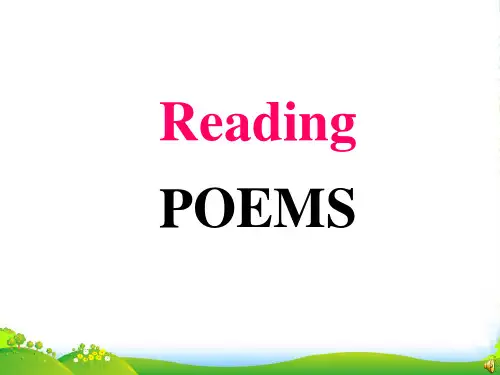
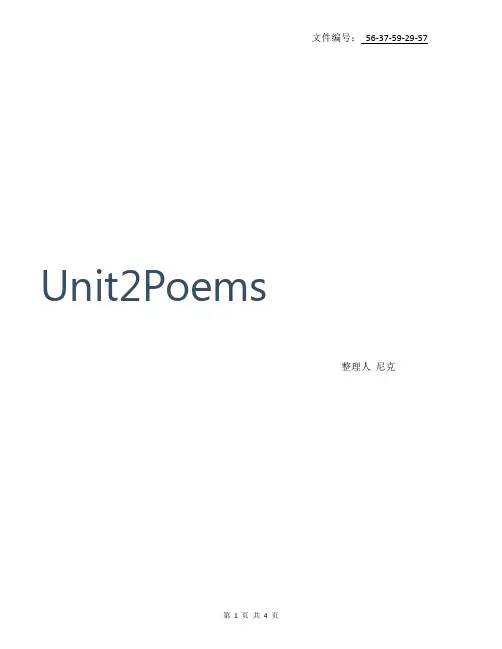
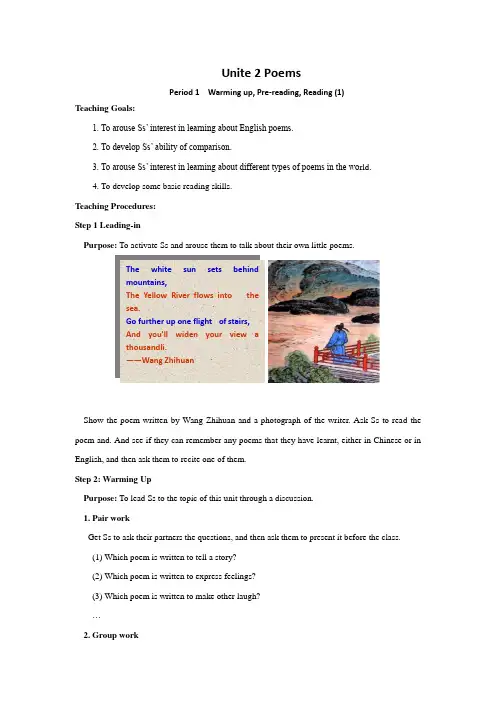
Unite 2 PoemsPeriod 1 Warming up, Pre-reading, Reading (1)Teaching Goals:1. To arouse Ss’ interest in learning about English poems.2. To develop Ss’ ability of comparison.3. To arouse Ss’ interest in learning about different types of poems in the wo rld.4. To develop some basic reading skills.Teaching Procedures:Step 1 Leading-inPurpose: To activate Ss and arouse them to talk about their own little poems.The white sun sets behindmountains,The Yellow River flows into thesea.Go further up one flight of stairs,And you'll widen your view athousandli.——Wang ZhihuanShow the poem written by Wang Zhihuan and a photograph of the writer. Ask Ss to read the poem and. And see if they can remember any poems that they have learnt, either in Chinese or in English, and then ask them to recite one of them.Step 2: Warming UpPurpose: To lead Ss to the topic of this unit through a discussion.1. Pair workGet Ss to ask their partners the questions, and then ask them to present it before the class.(1) Which poem is written to tell a story?(2) Which poem is written to express feelings?(3) Which poem is written to make other laugh?…2. Group workGet Ss to talk about the world famous poets. The pictures below can be used for Ss to talk about, and Ss can also talk as much as they can.William Shakespeare George Gordon Byron Li Bai威廉·莎士比亚乔治·戈登·拜伦李白(1) William Shakespeare: English playwright and poet whose body of works is consideredthe greatest in English literature. His plays, many of which wereperformed at the Globe Theatre in London, include historical works,such as Richard II, comedies, including Much Ado about Nothing andAs You Like It, and tragedies, such as Hamlet, Othello, and KingLear. He also composed 154 sonnets. The earliest collected edition ofhis plays, the First Folio, contained 36 plays and was publishedposthumously (1623).(2) George Gordon Byron: British poet acclaimed as one of the leading figures of theRomantic Movement. The Byronic hero lonely, rebellious, andbrooding first appeared in Manfred (1817). Among his other works areChilde Harold (1812-1818), The Prisoner of Chilton (1816), and theepic satire Don Juan (1819-1824). Byron was notorious for his loveaffairs and unconventional lifestyle. He died while working to secureGreek independence from the Turks.(3) Li Bai: Chinese poet who spent much of his time wandering and composingromantic, wine-inspired verse.Conclusion: All these poets are well known to the whole world and do you know any poems written by them? Can you recite to all the class?Step 3. Pre-readingPurpose: To help Ss learn about the context of the Reading part.1. Group workAsk Ss to discuss the questions with their partners in groups of four.(1) Do you have a favorite poem in Chinese?(2) Why is it your favorite poem?(3) Do you have a favorite poem in English?(4) Why is it your favorite poem?For example:(1) My favorite poem in Chinese is: 去年今日此门中,人面桃花相映红。
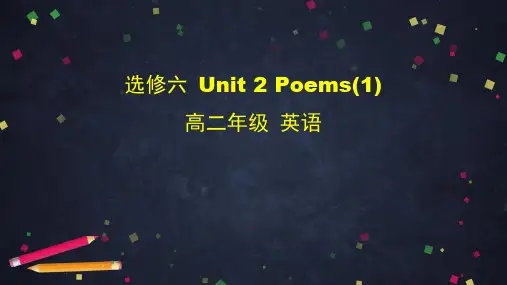
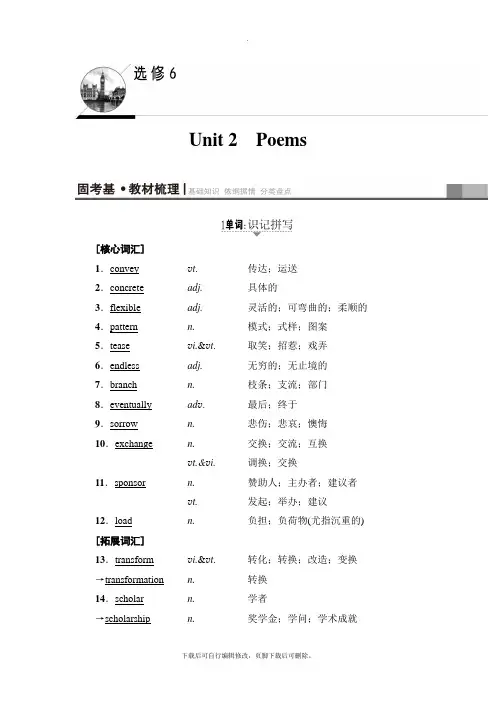
Unit 2Poems[核心词汇]1.convey v t. 传达;运送2.concrete adj.具体的3.flexible adj.灵活的;可弯曲的;柔顺的4.pattern n.模式;式样;图案5.tease v i.&v t. 取笑;招惹;戏弄6.endless adj.无穷的;无止境的7.branch n.枝条;支流;部门8.eventually ad v. 最后;终于9.sorrow n.悲伤;悲哀;懊悔10.exchange n.交换;交流;互换v t.&v i.调换;交换11.sponsor n.赞助人;主办者;建议者v t.发起;举办;建议12.load n.负担;负荷物(尤指沉重的) [拓展词汇]13.transform v i.&v t. 转化;转换;改造;变换→transformation n.转换14.scholar n.学者→scholarship n.奖学金;学问;学术成就15.translate v. 翻译→translation n.翻译;译文→translator n.译员;翻译家16.appropriate adj.适当的;正当的→inappropriate(反义词)adj.不适当的17.warm adj温暖的;暖和的→warmly ad v. 热情地;热烈地→warmth n.暖和;温暖18.dark adj.黑暗的→darkness n.黑暗;漆黑1.take it easy轻松;不紧张;沉着;休息2.in particular 尤其;特别3.hold on 别挂断;继续;坚持;保持4.stay up 熬夜5.run out of 用完6.be made up of 由……构成7.try out 测试;试验8.let out 发出;放走教材原句——会背诵句式仿写——能应用1.There are various reasons why people write poetry.(why引导定语从句修饰先行词reasons。
Unit 2 Poems制卷人:歐陽文化、歐陽理複;制卷時間:二O二二年二月七日Ⅰ.单句语法填空1.I found it hard to_convey (convey)my feelings in words.2.Let your child know that you expect him or her to act appropriately(appropriate) toward other people.3.Every moment of every day,energy is being transformed from one form into another.4. Knowing that they had arrived safely took a load off my mind.5. I have offered to paint the house in exchange for a week's accommodation.Ⅱ.单句改错1.The only reason that I came was that I wanted to meet your friends.____________________________________________________【答案】第一个that→why2. With the boy lead the way,we found the house easily the day before yesterday.____________________________________________________【答案】lead→leading3. The reason for my absence was because I was ill.____________________________________________________【答案】because→that4.If possibly,I will go with you to see the film.____________________________________________________【答案】possibly→possible5.The company's head office is in the city,but it has branch all over the country.____________________________________________________【答案】branch→branchesⅢ.完成句子1.我不明白为什么老板竟然放过那个女孩,因为在我看来,就是她的过失造成了损失。
人教版高中英语选修6《Unit 2 Poem s》教案2篇Teaching plan of unit 2 Poems编订:JinTai College人教版高中英语选修6《Unit 2 Poems》教案2篇前言:英语作为在许多国际组织或者会议上都是必需语言,几乎所有学校选择英语作为其主要或唯一的外语必修课。
英语教学涉及多种专业理论知识,包括语言学、第二语言习得、词汇学、句法学、文体学、语料库理论、认知心理学等内容。
本教案根据英语课程标准的要求和教学对象的特点,将教学诸要素有序安排,确定合适的教学方案的设想和计划、并以启迪发展学生智力为根本目的。
便于学习和使用,本文档下载后内容可按需编辑修改及打印。
本文简要目录如下:【下载该文档后使用Word打开,按住键盘Ctrl键且鼠标单击目录内容即可跳转到对应篇章】1、篇章1:人教版高中英语选修6《Unit 2 Poems》教案2、篇章2:人教版高中英语选修6《Unit 2 Poems》教案篇章1:人教版高中英语选修6《Unit 2 Poems》教案教学准备教学目标教学目标(Teaching Aims)知识与技能(Knowledge and Skills)1.了解教学大纲关于语法填空的命题特点。
2.能够根据语法填空的命题特点自己编语法填空的题目3.掌握语法填空的解题方法与技巧过程与方法(Process and Methods)让每一位同学都能参与到课堂教学与活动中来,以小组或结对的形式进行相互学习和讨论。
情感态度与价值观(Feeling, Attitudes and Values)学习应对语法填空是与课文相结合,让学生在了解各种不同诗歌形式的背景下学习语法填空的设题与解题特点,从而更加理解英语诗歌的特色,更加懂得如何阅读和欣赏英语诗歌。
教学重难点教学重点(Important Points):1.让学生了解语法填空的命题特点2.掌握语法填空的解题方法与技巧教学难点(Difficult Points):语法填空中词性的转换教学过程(Teachers’ Activities)Step I: Lead-in① Review the new words and expressions of this unit by them together, and then do Task 1---speak out the other forms according to the giv en words② Listen to the song Jingle Bells and try tofill a word into each blank.Step II : Pre-practising1.Questions① Do you think it is difficult to complete the items of blank-filling with grammar knowledge?② Have you figur ed out the characteristics of the item?2.ExplainingIn this item there are 10 blanks for you to fill in with less than one proper word① some blanks with a given word while otherswith none② fill in the blanks with the proper form of the given word according to its grammatical and logical meaning.③ choose a preposition, pronoun, conjunction or an article to fill in the blank without any given word.3.DiscussionHow can we finish the items step by step with our grammar knowledge?① ___________________________________________.② _ __________________________________________.③ ___________________________________________.Step III : While-practising1.Making an item of grammatical blank-filling based on the para graph of the text.① more than 5 blanks.② some blanks with given word.③ others with none.2.exchange the item you made for your partner to complete it .3.The whole class finis h the one the teacher prepared for them.Step IV : Post-practising1.Check some of the students’ anwsers and give comments.2.Draw a conclusionStep V: Homework Assign ment1.Further improve your skills of dealing with the grammar filling.plete Ex.2 on Page 10, Nanfang New Class篇章2:人教版高中英语选修6《Unit 2 Poems》教案【按住Ctrl键点此返回目录】教学准备教学目标Teaching goals1.Target languagea. Important words and phrasesPoem, poetry, recite, aspect, convey, nursery, rhyme, diamond, cottage, balloon, sparrow, tease, salty, endless, translate, nursery rhyme, take it easy, run out of, make up ofb. Important sentencesWhich poem is about things that don’t make sense?Poets use many different forms of poems toexpress themselves.I hadn’t taken my eye off the ball.We hadn’t taken it easy.The poem is made up of five lines.A lot of Tang poetry has been translated into English. The translations have a free form that English people like to copy.2.Ability goalsa. Enable Ss to talk about different types of poems: nursery rhymes; list poems; cinquain,; haiku; Tang poemsb. Enable Ss to talk about different purposes of writing poems.c. Understand the main theme of each poem.d. Enable Ss to chant some of their favorite poems.3.Learning abilityEnable Ss to distinguish different types of poems 教学重难点Teaching important points1.Talk about five main types of poems.2.Understand the main purpose of writing the poems.Teaching difficult points1.Find the rhythm of each poem.2.Chant the poem.3.Understand the main purpose of writing the poems.教学过程Teaching procedures to share a feeling or experience; to describe something in detail or give an impression; to get the reader to think about an idea; to express a point of view; to make the reader experience the sight, sounds, smells, feel and tastes of something; to create a mood, to play with words--- their sounds, rhyme and rhythm.)If time permits, in small groups or as a class, discuss the kinds of topics that poets write about.( people, animals, nature, landscapes, the sea, the seasons, stories, death, war, youth and old age,feeling and experiences, emotions like love, hate, sadness, regret and desire, etc.)Step 4.Pre-readingPeople from different countries write different kinds of poems. Get Ss to discuss the questions on Page 9 with their partners: Do you have a favorite poem in Chinese? Why ? Do you have a favorite poem in English? Why?As to exercise 2, give Ss practice in animportant reading skill: scanning a text, that is, looking through a text quickly to find specific information. Read the table in exercise 2 with the Ss. Tell them that they are going to look for the information in the table, just in the poems themselves, not in the other parts of the text. They are to look only for those pieces of information and not readevery word. Do an example with them.Suggested answers to exercise 2:Step 5.ReadingScanningGet the Ss to read the passage quickly and accurately and meanwhile help the Ss to form a good habit of reading. Teacher gives Ss a couple of minutes to look through the whole passage. Tell them to read the text silently and then ask some detailed questions about the text on the slide show . Teacher should encourage Ss to express their ideas.Q1.Why do people write poetry?Q2.How many forms of poems are mentioned in the passage? What are they?Q3.What does “nursery rhyme” mean? Why do they delight small children?Q4.What’s the characteristic of “list poems”? What about “cinquain”?Q5.Why do English People like “Haiku”?Q6.Are you familiar with Tang Poems? Do you know the title of the last poem in the text?ListeningBefore Ss read the text, have them close their books and listen to the text with their eyes closed. This gives Ss the opportunity to listen to the sounds or “music” of the poems before reading them in detail. Tell them that it doesn’t ma tter if they don’t understand every word.First readingGet Ss to read the text carefully, finding the one sentence that sums up the paragraph of each part.. Underline the topic sentence.Second readingTell Ss that they are going to look at the rhythm of two of the poems. Make sure they know what rhythm is. Read the limerick aloud and have Ss listen for the strong beats. Then have them clap the strong beats asyou read. Mark the strong beats on the limerick on the board.There was an old man with a beardWho said “it is just as I feared”.“Four insects and thenTwo birds and a henHave all made a home in my beard”.Now read the poem A & B. Ask them to mark the strong beats on the two poems that have a strong rhythm. Check their answers . Then play the tape and get them to clap to the strong beats in those two poems.Third readingJust as any scene can serve as the subject of a painting, so any part of daily life can provide material for a poem.. Of course, the choice that the artist or poet makes relates to his or her purpose. Poetry is usually short and compact, so it should beread several times, preferably aloud, to appreciateits meaning. Read the last poem (Poem H), and answer the following questions:Q1.What parts of the poem suggest that the woman loves her husband?Q2.How do you understand the sentence” Shouldthe journeyer return, this stone would utter speech.”? Explain the sentence in your own words.Q3.What picture do you have in your mind when you read the above sentences?Q4.Do you know the Chinese title of this poem? Do you know the Chinese version of the poem?Step 6.Make a short summary of this period.课后习题Homework1.Surf some websites to find out more information about poets.2.Review the content of the reading passage.3.Finish the exercises on Page 12& 13.-------- Designed By JinTai College ---------。
Unit 2 Poems语言点编稿:牛新阁审稿:王春霞学习目标重点词汇convey, load, concrete, tease, contradictory, flexible, eventually, transform, appropriate, exchange, sponsor, blank重点短语take it easy, run out of, be made up of, in particular, try out, let out重点句型reason+从句知识讲解重点词汇【高清课堂:Unit 2词语精讲convey--load】convey【原句回放】Others try to convey certain emotions. 而有些诗试图传达某种感情。
【点拨】convey vt.传达;运送;表达1. A good photograph can often convey(传达)far more than words.好的照片经常比文字更能传情。
2. These results will enable us at least to convey(表明)a sense of progress.这些结果至少能表明一种进步的感觉。
3.Please convey (转达) my appreciation to your President.请代我向您的总裁/总统转达我的感激之情。
4. A taxi conveyed(运送)us to the train station. 一辆出租车把我们送到火车站。
(convey sb. to some place 用车送某人去某地)load【原句回放】Slowly the old man carries his load. 老人慢慢地挑着担子前行。
【点拨】load n. 负担,负重1. The men were struggling with their heavy loads.这些人因为负担沉重而挣扎着。
Unit 2 Poems8th Unit Revision教材分析[the analysis of teaching materials]This unit talks about poem. The emphasis of this period will be placed on reviewing the important new words, expressions and sentence patterns in the parts;Warming up, Pre-reading, Reading and prehending. The aim is to make students grasp and use these important points thoroughly.1.学情分析[the analysis of the students]Our students dislike to memorize words and language points, so this class will help them memorize language points by exercises.2.教学目标[Teaching aims][1]知识目标[Knowledge aim]a. Get students to go over the useful new words and expressions in this unitb. Have students review the grammar item; the inversion .[2]能力目标[Ability aim]a. Develop student’s ability to use the important language points in this unit.b. Enable student to learn to use the usages of inversion.[3]情感目标[Emotion aim]Promote the Ss to develop the interest of learning English .3.教学重难点[teaching important points and difficult points]a.Get students to review and consolidate what they have learned in this unitb.Develop students’ ability to solve problemsc.Get students to turn what they have learned into their ability4.教学过程[Teaching procedures]Step 1:Review words and phrases 10’①Give the Ss about 5 minutes to review words and expressions in unit2.②Ask the Ss to finish exer.2 in the Unit Review.Step 2:Review Language points 20’①Give the Ss about 8 minutes to review language points in unit2.②Ask the Ss to finish exer.2 in the Unit Review.Step 3;Review Grammar 15’①Give the Ss about 5 minutes to review grammar in unit2.②Ask the Ss to write down the grammar structure by themselves.③Ask the Ss to finish exer.3 in the Unit Review.Step 4:HomeworkReview Unit Revision5.板书设计7.b.can you use them freely and correctly?c.Do you know the function of the usages of inversion?[2]单元复习Unit2 Poems单元复习一.基础检测(B/C层)1.传达;运送2.具体的3.引起矛盾的5.灵活的;可弯曲的6.模式,式样7.村舍8.轻松;……构成 10.取笑;招惹 11无穷的;无止境的12.翻译;译文 13.枝条;支流 14.尤其,特别15.最后 16.转化;改造18.适当的 19.交换;交流21.测试;试验 22.发出;放走一.单元考点(A/B层)1. convey(vi) 向某人表达/传达某物___________________把某物或某人从A地运送到B地______________________对……表达某人的情感/意思/难过2.sense 弄懂/理解___________有/无意义_______________从某种意思上说__________________决不______________视觉____________3. take it easy______________碰运气____________认为……理所当然________________4 run out of______________run short of sth ____________不足,短缺____________用尽,筋疲力尽___________用完,消耗掉_____________5.(be) made up of =be________of = _________of 由……组成Make up_______ make up______弥补铺床叠被________开玩笑 make_____of 前进_______________6 嘲笑某人__________________愚弄某人_____________________开某人玩笑___________________ 捉弄某人___________________7. in particular_____________ 对……讲究,挑剔__________________为……所特有______________8. appropriate(adj) 适合;合乎____________________;it is appropriatethat___________9.exchange(n&v) 交换________________ 作为交换_____________________ 以……交换___________________ 与某人交换某物_______________________ 与某人交流___________________10.hold on_____________ hold back _______________ hold down ___________hold out_____________ hold up__________11.try out__________ 试穿________________ 参加选拔_________________争取______________ 尝试做某事______________12.let out _________ 更不用说___________ 使失望_________让……进来___________ 让……下车_______________三.单项选择1. Nowadays sending s to each other is a way many a student _____ what they think.A. conveysB. conveyC. accountD. accounts2. –Mon, I just can’t fall asleep thinking of the interview tomorrow.--________ You are sure to make it.A. Don’t lose heart.B. Take it easy.C. Take your time.D. What’s up.3. The reason _____ he was ill that day was actually made up by his brother. In fact, the reason ______ he was absent was ____ he went to see a film.A. that; why; thatB. for which; why thatC. that; why; becauseD. why; that; because4. The photographer needs to charge up the digital camera every day as the battery _____ quickly. (某某2005春)A. shuts upB. ends upC. runs outD. turns out5.The whole meal was good and the wine_______ was excellent.A. on particularB. on purposeC. in particularD. in return6.The girl read the letter with tears_______ down her cheeks.A. ranB. runningC. runD. to run7.——John went to the hospital alone .——If he ______ me about it, I would have gone with him.A. should tellB. tellsC. toldD. had told8."If I hadn't practiced when I was younger,” the musician says," I____ able to play so well now.A. couldn’t have beenB. won’t beC. wouldn't have doneD. wouldn't be答案:BBACC BDD。